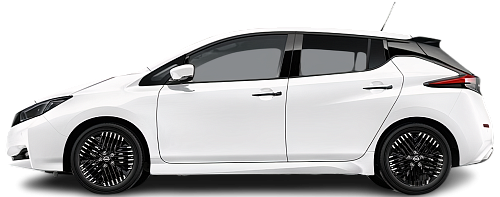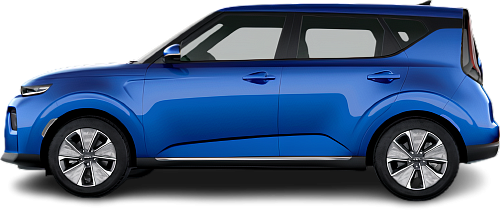Global EV Comparison: Nissan Leaf 40 kWh vs Kia Soul EV Long Range
Struggling to Decide? Let AI Help!
Your AI Summary Is Ready!
General Info
The Kia Soul EV Long Range (2020-…) is currently produced, it has a starting price of €47450. The Nissan Leaf 40 kWh (2022-2025) has been discontinued. You can find it for as low as €15890 on the used car market.
The Nissan Leaf 40 kWh (2022-2025) is a Hatchback, whereas the Kia Soul EV Long Range (2020-…) is a SUV.
| Property | Nissan Leaf 40 kWh | Kia Soul EV Long Range |
|---|---|---|
| Years of Production | 2022-2025 | 2020-… |
| Current Status | Discontinued | Produced |
| Country of Manufacture | Japan, UK, USA | South Korea |
| Body Style | Hatchback | SUV |
| Market Availability | EU, USA | EU |
| Price Europe (New) | - Price Europe (New) | €47450 |
| Price Europe (Used) | €15890 | €19873 |
| GCC Score | 4.8 | 5.6 |
Range and Efficiency
While the Kia Soul EV Long Range (2020-…) offers a longer real-world range and a bigger battery, it is less energy-efficient than the Nissan Leaf 40 kWh (2022-2025).
| Property | Nissan Leaf 40 kWh | Kia Soul EV Long Range |
|---|---|---|
| Range (EPA) | 240 km | 391 km |
| Range (WLTP) | 285 km | 452 km |
| Range (GCC) | 238 km | 378 km |
| Battery Capacity (Nominal) | 40 kWh | 67.5 kWh |
| Battery Capacity (Usable) | 39 kWh | 64 kWh |
| Efficiency per 100 km | 16.4 kWh/100 km | 16.9 kWh/100 km |
| Efficiency per kWh | 6.1 km/kWh | 5.91 km/kWh |
| Range and Efficiency Score | 5.5 | 6.8 |
Charging
Both vehicles utilize a standard 400-volt architecture.
The Kia Soul EV Long Range (2020-…) offers faster charging speeds at DC stations, reaching up to 77 kW, while the Nissan Leaf 40 kWh (2022-2025) maxes out at 50 kW.
The Kia Soul EV Long Range (2020-…) features a more powerful on-board charger, supporting a maximum AC charging power of 7.2 kW, whereas the Nissan Leaf 40 kWh (2022-2025) is limited to 3.6 kW.
| Property | Nissan Leaf 40 kWh | Kia Soul EV Long Range |
|---|---|---|
| Max Charging Power (AC) | 3.6 kW | 7.2 kW |
| Max Charging Power (DC) | 50 kW | 77 kW |
| Architecture | 400 V | 400 V |
| Charge Port | CHAdeMO | CCS Type 2 |
| Charging Score | 3.3 | 4.5 |
Performance
Both vehicles are front-wheel drive.
Both cars deliver the same 0-100 km/h acceleration time, but the Kia Soul EV Long Range (2020-…) boasts greater motor power.
| Property | Nissan Leaf 40 kWh | Kia Soul EV Long Range |
|---|---|---|
| Drive Type | FWD | FWD |
| Motor Type | PMSM | PMSM |
| Motor Power (kW) | 110 kW | 150 kW |
| Motor Power (hp) | 148 hp | 201 hp |
| Motor Torque | 320 Nm | 395 Nm |
| 0-100 km/h | 7.9 s | 7.9 s |
| Top Speed | 144 km/h | 167 km/h |
| Performance Score | 3.1 | 3.8 |
Dimensions
The Nissan Leaf 40 kWh (2022-2025) has a longer body, while the Kia Soul EV Long Range (2020-…) stands taller, offering a more elevated ride. Their widths are almost identical, so both offer a similar amount of shoulder room.
The Nissan Leaf 40 kWh (2022-2025) boasts a more extended wheelbase.
| Property | Nissan Leaf 40 kWh | Kia Soul EV Long Range |
|---|---|---|
| Length | 4490 mm | 4195 mm |
| Width (with Mirrors) | 2030 mm | - Width (with Mirrors) |
| Width (w/o Mirrors) | 1788 mm | 1800 mm |
| Height | 1530 mm | 1605 mm |
| Wheelbase | 2700 mm | 2600 mm |
Cargo and Towing
The Nissan Leaf 40 kWh (2022-2025) features a larger trunk, but the Kia Soul EV Long Range (2020-…) offers greater maximum cargo capacity when the rear seats are folded.
Neither car is equipped with a frunk (front trunk).
Neither vehicle is officially rated for towing in in the EU.
| Property | Nissan Leaf 40 kWh | Kia Soul EV Long Range |
|---|---|---|
| Number of Seats | 5 | 5 |
| Curb Weight | 1580 kg | 1758 kg |
| Cargo Volume (Trunk) | 435 l | 315 l |
| Cargo Volume (Max) | 1176 l | 1339 l |
| Cargo Volume (Frunk) | - Cargo Volume (Frunk) | - Cargo Volume (Frunk) |
| Towing Capacity | - Towing Capacity | - Towing Capacity |
| Cargo and Towing Score | 4.5 | 5.5 |




